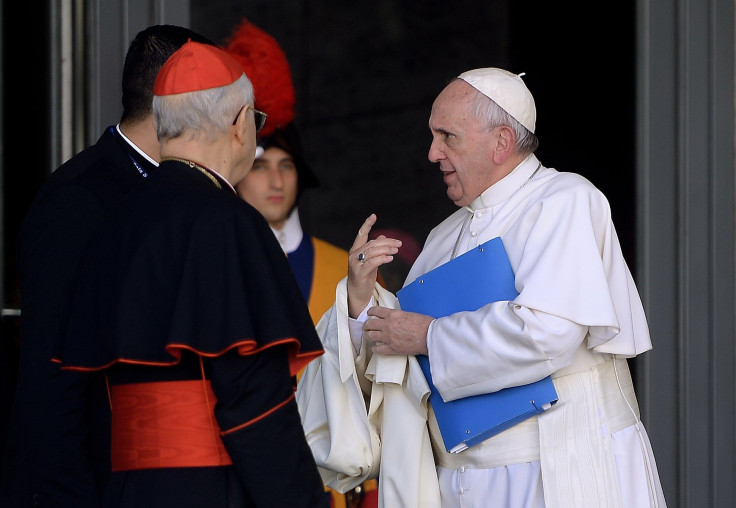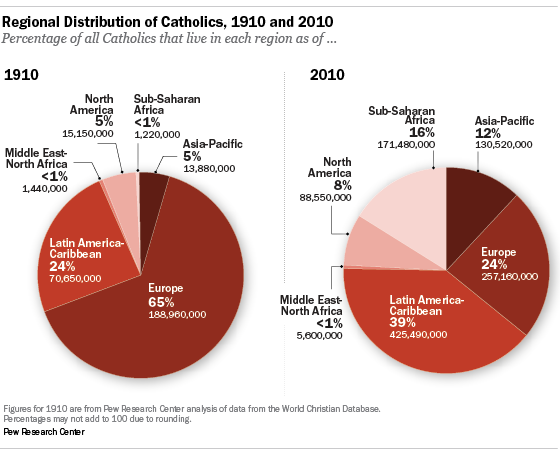Catholic Synod 2015 Illuminates Fierce Tensions Between Church Conservatives And Pope Francis

As the Synod of Bishops, a three-week gathering of Roman Catholic leadership from around the world, comes to a close in Vatican City this weekend, it's unlikely that any substantial "policy" or doctrinal changes to Roman Catholic teaching will emerge from the conference. But one thing is clear from the proceedings, say experts: The church hierarchy is facing more division and discord than it has in years -- and it poses a threat to Pope Francis' pastoral approach and hope for a more inclusive church.
"The conservative resistance has been stronger and bolder than many imagined," said Andrew Chesnut, professor of religion at Virginia Commonwealth University. "Pope Francis just doesn't have the votes for those changes he was advocating. The events of the synod demonstrate just how tough it is to find consensus in a global church of 1.3 billion members."
The biggest tug-of-war at this year's synod, which focuses on family issues, has been over two major points of contention under discussion: whether divorced and remarried Catholics can receive Communion, and whether language describing homosexuality as being "intrinsically disordered" can be stricken from church teachings in order to offer gays and lesbians a better welcome into the church.
Francis, who has struck a tone of inclusion since ascending to the papacy in 2013, has not outwardly called for change in these two areas, but experts say he's signaled it through his language and encouragement of open debate at the synod.
But the backlash from more conservative elements in the church has been swift -- one archbishop called the controversial policy proposals as having the smell of "infernal smoke," while 13 conservative cardinals from around the world allegedly sent the pope a letter voicing their displeasure over "problematic" sections in the synod's preparatory document that included the contested issues.
No-Drama Francis
The 270 bishops from 122 countries will finalize a document of recommendations for Francis on Saturday, when the entire group will vote on its content before presenting it to the pontiff. The final document could be released to the public as early as Saturday night. But it's up to the pope to implement the recommendations as he pleases -- he has the ultimate authority on church doctrine. And while Pope Francis is beloved around the world, some Vatican-watchers have likened him to a president facing a hostile Congress who can't get the support he needs to pass his reforms.
"Some progressives still hope that Pope Francis can somehow magically pull victory from the jaws of defeat. I don’t think so," said Thomas J. Reese, senior analyst for the National Catholic Reporter. "His pastoral instincts are leading him in one direction, but his respect for collegiality is stopping him from getting too far out in front of the bishops."
Another roadblock in Francis' way, says Chesnut, is the fact that much of the resistance to a more progressive tone comes from conservative bishops in sub-Saharan Africa -- a region that represents some of the fastest growth in the Catholic church.
"The pope's job one is to grow the church and appeal to lapsed Catholics, which is why we see these issues like communion for divorced Catholics. The current church doctrine has alienated many lapsed Catholics, especially in Latin America. He saw that firsthand when he was archbishop of Buenos Aires," said Chesnut.

But the pope has to balance that concern with satisfying regions seeing a boom in Catholic membership, like Africa, where the bishops are decidedly more traditional when it comes to views on homosexuality and divorce. "Africa is where the future is,” Chesnut said. “A hundred years ago, less than 1 percent of global Catholics were in Africa. Now, it's home to 17 percent.”
"He's the evangelizer in chief. And the question he faces is how to satisfy the more liberal constituencies in the church with the more conservative African and Asians ones that happen to be the ones that are growing," said Chesnut.
It's unlikely that the recommendations of the synod will align with Francis' goals for the church, but it's equally unlikely that Francis will take bold steps to ignore his bishops and move unilaterally. At the same time, he doesn't seem to be giving up. He delivered a homily on Friday -- just one day before the final document votes -- that obliquely seemed to underline his views.
"Times change and we Christians must continually change," said Francis. "We must change firm in the faith in Jesus Christ, firm in the truth of the Gospel, but our attitude must continually move according to the signs of the times."
© Copyright IBTimes 2025. All rights reserved.





















